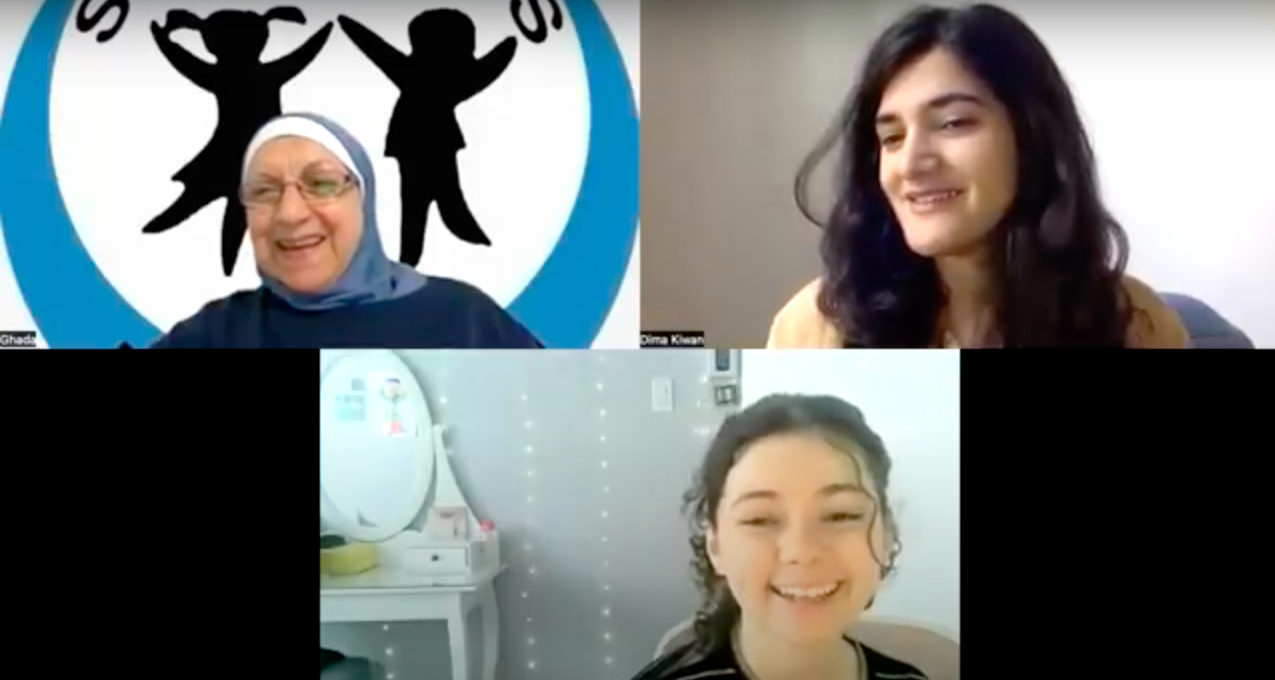This week, we spoke with Mrs. Ghada Homad, a valued Syrian Kids Foundation volunteer who has greatly advanced our adult English training program, helping several Syrian refugees build strong English foundations to study or work internationally. Ghada shared with us the goals and successes of this program, providing insight into the foundation’s activities beyond Al Salam School.
In 1990 in Montreal, Ghada first met Mrs. Hazar Mahayni, the current Al Salam School principal, and since then the two have remained close friends, sharing benevolent opportunities with each other whenever they can. Following the progress of Syrian refugee university students in Turkey, who graduated from either Al Salam or Turkish public schools, they saw that the universities’ English texts and references posed a common challenge. There was a need for accessible English training among these students, not only for their benefit during university, but also to widen their graduate study and career opportunities abroad post-graduation.
When Mrs. Hazar first proposed to Ghada that she train these students, aged 17 to 45, English online, she was admittedly hesitant. While she had strong English communication skills and worked in Kuwait as a professional in-house trainer in soft-skills, Ghada’s professional background was in engineering and information technology. That said, despite never having taught English before, Ghada was willing to try her best – and it definitely paid off.
Currently, Ghada maintains two intermediate classes and one advanced class, each for an hour every week, and delegates the beginner level students to new volunteers. Depending on their varied availability, teaching assistants Khashayar and Zayna may join her in class. After nearly two years and six semesters of providing this program, Ghada has received overwhelmingly positive feedback from the students, and she has developed several techniques to navigate the difficulties of training online.
As many of her students have unstable Internet connection and difficulty keeping their cameras on, Ghada shared that it’s sometimes challenging to perceive her students’ eye contact, body language, and level of engagement. To keep students engaged and increase their comfort in the interactive dynamic, she diversifies her teaching methods, from heated Kahoot vocabulary competitions to reading practice with real-time pronunciation corrections. She notes that students are most engaged when they’re challenged with difficult questions – they build off each other’s energy and drive to achieve new, higher academic accolades. Ghada proudly recalls some of her exceptional students who inspire her with their commitment every class – Mustafa, Liath, Adiba, Omar A, Baraa, and Maryam – as well as Omar M, a teenage self-taught computer programmer in her advanced class who never fails to bring fun and humor to their lessons.
As for which resources and materials Ghada leverages for her classes, she mentioned several free online books and exercises assembled by accredited universities, such as the University of Victoria, which are reliably accessible, correct, and of high educational quality. Beyond their weekly hour of class, Ghada encourages her students to revise the material on their own afterwards, and privately message her with any questions they have throughout the week. Especially for her shyer students, this constant support is critical to learning a new language to the best of their academic and professional abilities.
“I choose the topics for reading for my advanced class very carefully,” Ghada added, “I used to choose medical or engineering texts at times as many of the students are either engineers, doctors or medical students. But then I changed that. I choose articles that would benefit all of them in life. Articles about human rights, positivity – these past three lessons, we are reading about racism and how to fight it. I think it’s very important that they become exposed to subjects they may or may not have experienced yet. It will prepare them for the real world. [We discuss] morals, honesty, and commitment. I believe that now that I have gained their trust, I am able to be of some positive influence to them.”
As for Ghada’s future hopes for this program, she wishes for more committed volunteers to join teaching so that more students can be enrolled off the long waitlist, class sizes can remain small and effective, and perhaps more time slots can be offered to accommodate some students’ constraining work or family circumstances. Given unlimited funds, Ghada would provide personal tablets or laptops for students to regularly attend class and engage with the materials as much as possible, as many households in the community must take turns using a single device. Apart from overcoming this resource barrier, Ghada recommended attaching a certificate of completion to this program, not only to incentivize students, but also to recognize their hard-work and commitment to continuing education.
